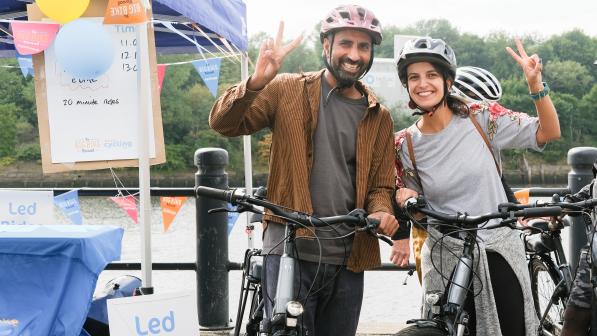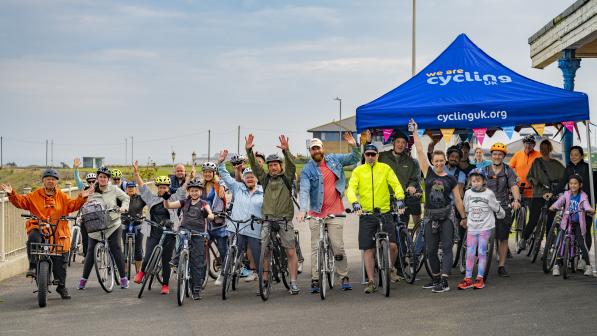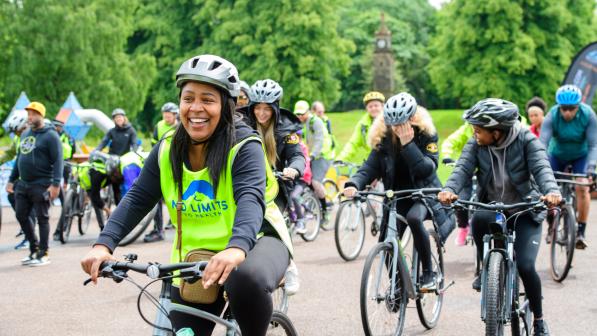Helen McIntosh: The Real Yellow Jersey winner who beat the bus with an e-bike
In the world of cycling, the yellow jersey is reserved for elite athletes: the leaders of the Tour de France, cheered on by crowds and cameras. But for Cycling UK, the real champions aren’t on the podium – they’re in our neighbourhoods, riding through our streets, using bikes to tackle some of society’s biggest challenges.
To mark 10 years of The Big Bike Revival, Cycling UK has once more launched Real Yellow Jersey campaign to celebrate people like Helen McIntosh, who started cycling for her commute and quickly became an advocate for all its benefits.
In Helen’s part of the city, public transport is sparse and unreliable. “I only had one bus in my area, and it was often late or didn’t show up,” she explained.
This was especially frustrating for Helen, who has three children, a full time job and is studying for a qualification, and therefore has little time to waste.
Sitting in traffic every day was really bothering me. I just wanted a change
That change came in the form of an e-bike. Helen took part in free adult cycling lessons in Newcastle, supported by Newcastle City Council and delivered by local cycling expert Bike Doctor Dave.
The project offered free access to e-bikes and support for people looking to make cycling part of their daily routine. Helen jumped at the chance – and hasn’t looked back.
“The event where I got to try an e-bike confirmed it for me. I realised I really loved cycling,” she said. “It was exhilarating. And even though the traffic could be scary at times, the instructors were incredibly supportive. After that session, I could finally see myself cycling on a regular basis.”
Now, Helen cycles to work three times a week, using the e-bike for her commute in all but icy conditions. And while it might look like a practical switch, it’s had a far deeper impact.
It’s given her confidence, that just because other people aren’t doing something, it doesn’t mean that she can’t.
I’m physically fitter – just that half hour of active travel before and after work has made such a difference. It’s fun, not like exercise. With the electric assistance, I’m not sweaty when I arrive, and I sleep better now . I feel more connected to everything around me. I see the sky instead of looking through dirty bus windows. It’s a completely different start to my day
Cycling into work has also meant that she can squeeze exercise into her day without having to find other pockets of time for it, meaning she hasn’t lost any of her valuable home time.
Helen, who’s lived in the area her whole life, also discovered something unexpected: the cycling infrastructure around her. “I had no idea the cycle path was even there,” she laughed. “I’ve lived here for years and never knew. The project pointed me to a website where I could find local routes. It opened up a whole new world.”
That awareness has improved more than just her commute: it’s also made her more confident on the road and even behind the wheel. “My balance has improved, I’m falling off my bike less, and I’m a better driver too,” she said. “I’m more aware of what it’s like from a cyclist’s point of view. That perspective is so valuable.”
What started as a workaround for unreliable buses has become a daily joy. Helen talks with a quiet passion about how cycling has brought her closer to her surroundings – and closer to herself.
I get home sooner. I feel more a part of things. It’s helped me become more mindful and aware of the environment. I don’t feel as disconnected
But Helen knows that her experience could be even better with improved infrastructure. “Cycle paths should be joined up on main roads, not just in parks or wagonways. The facilities near my work were a real eye-opener – we need more of that across the city.”
Her message to anyone thinking about trying an e-bike?
Just give it a go. Anyone who’s ever wanted to try: join a ride and experience it for yourself. People told me negative things about e-bikes, but honestly, that was all based on nothing. It changed everything for me
“I didn’t expect it to feel so exhilarating,” she said with a smile. “But it’s the best decision I’ve made in a long time.”
Too often, cycling is seen through the lens of elite sport: racing kits, finish lines, and medals. But for most people, cycling isn’t about competition; it’s about connection. It’s the school run without the stress, the morning commute that clears your head, or the weekend ride that lifts your mood.
That’s why Cycling UK’s Real Yellow Jersey campaign was created: to recognise and celebrate the everyday champions using bikes not for glory, but for good.


